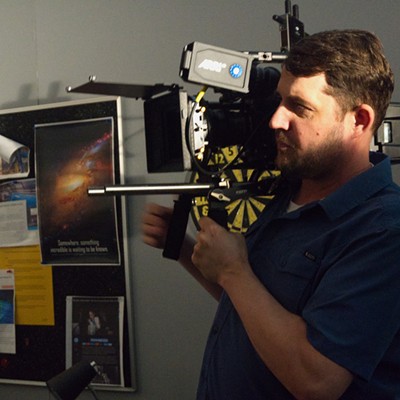From tragedy comes art, so Lyric Theatre presents the new musical Triangle at the Plaza Theatre, inspired by the disastrous Triangle Shirtwaist Factory fire. The show’s creators — Curtis Moore (music), Thomas Mizer (lyrics) and Joshua Scher (book with Moore and Mizer) — also link the story tenuously to the World Trade Center attack of 2001.
Although the results are mixed, they should get full credit for not shying away from dicey subject matter.
On March 25, 1911, a fire broke out at the Triangle factory in the Greenwich Village neighborhood of New York City.
To discourage pilfering, the company’s owners locked the building’s doors, so 146 workers died in the fire or leaping from the burning building’s upper floors, and scores were injured. The tragedy led to legislation requiring factory safety standards and improved working conditions for sweatshop workers. The building still stands and is part of New York University.

The story switches back and forth between 1911 and 2011. Brian (Adam Halpin), a chemistry doctoral student in 2011, occupies a laboratory in the Triangle building.
Coincidentally, outside his office, a couple appeared on the ledge in 1911, and as fatal flames burned behind them, they kissed, and then the man held the woman out and dropped her nine floors to her death. Neither were ever identified.
While Brian navigates the treacherous waters of contemporary academia, Sarah (Megan McGinnis), a Triangle seamstress in 1911, struggles with the English language, the blasphemy of being required to work on Sabbath, caring for her pregnant and widowed sister and the pending arrival of their father from the old country.
If this isn’t enough, add the sudden appearance of love in both their stories, and you have serious complications. When Brian sings about “dumb cliché,” one tends to agree.
Other cast members portray dual characters from two centuries. Dallas Lish plays the love interest of both Brian and Sarah. Sharon Rietkerk provides comic relief, some of it forced, as Brian’s colleague and Sarah’s sister. Adam Heller and Jennifer Teel give strong performances in supporting roles.
Director Michael Baron stages the show with efficiency and efficacy. The actors manipulate much of the scenery, as Adam Koch’s set design provides seamless transitions across time and space, enhanced by Art Whaley’s lighting design. Jeffrey Meeks’ costumes are as serious as a heart attack.
Moore has composed a serviceable score, but it’s doubtful you’ll walk out of the theater humming any of the tunes. When Brian thinks he sees a ghost, the eerie, ominous music would not be out of place in Psycho.
Appropriately, for a musical set in a clothing factory, the story has some loose threads, so the ending tells more than it shows. The creators of Triangle want to leave audiences with a sense of hope at the conclusion of this tragic tale — or tales, actually — and you can’t blame them for doing so. The ending will induce a cardiac glow in some theatergoers, and in others, it may cause eye-rolling. Both reactions are completely reasonable.












